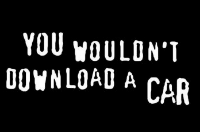Over the years many initiatives to curb online piracy have emerged and in several countries so-called graduated response schemes have been implemented.
Initially copyright lobbyists opted to embed these “x-strikes” initiatives into law, as France did with Hadopi. However, more recently there has been a bigger push for voluntary initiatives.
In the U.S., for example, copyright holders and Internet providers launched the six-strikes Copyright Alert scheme earlier this year, and UK copyright holders want the same to happen across the pond.
The upside for the copyright holders and ISPs is that there’s no interference from the government. However, this also means that there is very little oversight, which can turn out negatively for consumers in the long run.
To safeguard the interests of the public the Internet Society (ISOC) has published a set of principles which all voluntary anti-piracy measures should adhere to. The group, which is one of the leading players in creating Internet related standards, education, and policy, hopes that initiatives such as the Copyright Alert System will adhere to these guidelines.
“We strongly believe that ALL voluntary mechanisms should employ accountable and transparent practices, including the ability of users to have access to information and to receive clear notifications in advance, the existence of clear and proportionate enforcement policies and, the assurance of protecting users’ privacy,” ISOC policy advisor Konstantinos Komaitis tells TorrentFreak.
ISOC believes that voluntary anti-piracy schemes should be in the best interests of consumers, and not merely a convenient anti-piracy tool for copyright holders.
“Ultimately, voluntary based initiatives should serve the public and its interests. They should not be used as a back door for achieving goals not otherwise achieved through other, more traditional regulatory means,” Komaitis says.
The U.S. six strikes Copyright Alert scheme says its main goal is to educate the public, which appears to be in line with ISOC’s principles. However, the Internet Society notes that the educational messages should ideally come from objective and unbiased parties rather than the copyright holders themselves.
“If education is part of such programs, the Internet Society believes that it should be limited to providing unbiased information and empowering users to better understand the scope and rationale of copyright law,” Komaitis tells us.
“Copyright law is complex — it includes rights but those rights are further subject to limitations and exceptions. Messages sent to users should address all these aspects of copyright law.”
While the Internet Society hasn’t carried out any detailed reviews yet, it’s not certain that the educational messages put forward by the U.S. system are truly objective.
“Now, are the current participants in the Copyright Alert System able to provide such information? Perhaps. But, if we truly wish voluntary initiatives, including ones on copyright, to stand the test of time and if we want them to instill trust, then it is important that any such messages derive from trusted third parties, like academia,” Komaitis says.
“Such trusted parties, being not part of the system’s original design, can ensure a certain degree of credibility, impartiality and confidence to the intended outcomes of the system,” he adds.
Whether the Copyright Alert System will adopt ISOC’s principles or not, the critique appears to be partially justified. As we’ve previously pointed out, the educational messages that ISPs send out are far from objective, with some warning about all sorts of doom and gloom users of P2P software are subjecting themselves to.
On the transparency side there is also plenty of room for improvement. Thus far the U.S. system has not published any progress reports or statistics and none of the ISPs has published their educational messages online so they can be reviewed by the public and copyright experts.
To the defense of the Copyright Alert System, the group’s Advisory Board does include public rights advocates including Jerry Berman, the Chairman of the Internet Education Foundation and founder of the Center for Democracy and Technology, and Gigi Sohn, co-founder of Public Knowledge. Unfortunately, the Advisory Board has little control over what the educational notices state, and other the transparency side they can do little more than making recommendations.







